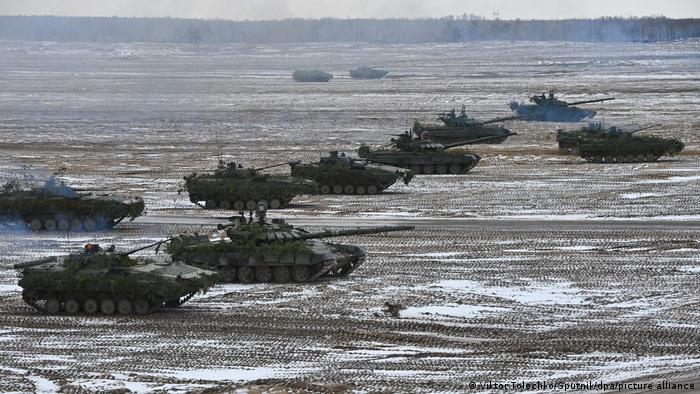
Across Europe, countries readjusted their security posture as the US stepped up its warnings about the potential for a Russian invasion of Ukraine.
US officials said intelligence shows Russia could be planning to attack Ukraine before the end of the Olympics.
As tensions spiked on Friday, Washington announced that President Joe Biden and Russian President Vladimir Putin will speak on the phone on Saturday. Talks between Putin and French President Emmanuel Macron are also expected.
What has the US said?
On Friday, more Western nations called for their citizens to leave Ukraine as US national security adviser Jake Sullivan said a Russian invasion of Ukraine could start any day and would likely begin with an air assault.
White House press secretary Jen Psaki told a regular briefing: "We recognize that were President Putin to make the decision to invade, it would make it difficult for American citizens on the ground."
"We want to make clear of the risk posed to them, to any civilian if they remain in the country," she added.
US Secretary of State Antony Blinken said on Friday that Russian forces could invade Ukraine "at any time."
"We're in a window when an invasion could begin at any time and to be clear — that includes during the Olympics," Blinken said during a visit to Australia.
In a call with his Ukrainian counterpart, Dmytro Kuelba, Blinken assured that Washington continues to support Kyiv's "sovereignty and territorial integrity."
How have European leaders reacted?
German Chancellor Olaf Scholz spoke with Biden, Macron and Canadian Prime Minister Justin Trudeau — with the leaders reaffirming the need for strong and swift sanctions in the event of an invasion of Ukraine.
"The allies are determined to jointly take swift and deep sanctions against Russia, should there be further violations of Ukraine's territorial integrity and sovereignty," Germany's government spokesperson said on Twitter.
"All diplomatic efforts are aimed at persuading Moscow to de-escalate. The aim is to prevent a war in Europe."
Scholz is due to travel to Kyiv on Monday "to discuss joint and decisive actions to counter threats," Ukraine's Foreign Minister Dmytro Kuleba said on Twitter.
Macron, who traveled to Moscow and Kyiv this week in an effort to break the impasse, has said that he will speak with Putin again on Saturday.
Western leaders, including Macron, agreed to prioritize "diplomacy, dialogue, and deterrence to achieve de-escalation," the French presidency said in a statement.
European Commission President Ursula von der Leyen said sanctions in the event of an invasion would target Russia's financial and energy sectors.
Late Friday evening, Russia's Foreign Ministry reacted to the statements, saying Western countries were using a willing media to spread false information that Moscow may be planning to invade Ukraine. A statement on the ministry's website insisted the West was trying to distract from its own aggressive behavior.
Kyiv calls for Berlin's help
Meanwhile, Ukraine's ambassador to Germany, Andriy Melnyk, went on the public offensive Friday to pressure the Scholz administration.
"We want the Germans to recognize the seriousness of this situation, and that we will be helped — hopefully with defensive weapons, but also by economic support," Melnyk said on WeltTV.
The ambassador said the weapons would not necessarily be used in the field but could offer added leverage in negotiations with Putin.
"We are not suicidal, but we have to know that if this terrible scenario has to happen, the price for Mr. Putin and his soldiers would be so high so this war might still be averted."
He also said Kyiv expects Germany to set a course for Ukraine to have a chance of immediately joining the EU. Ambassador Melnyk also insisted that NATO membership for Ukraine should also remain on the table.
What is happening on Europe's eastern flank?
Canada, Estonia, Denmark, the United Kingdom, Latvia, Lithuania, Australia and New Zealand joined Norway, the Netherlands and the US in calling for their citizens to leave Ukraine. The European Union mission to Ukraine also advised non-essential staff to leave the country.
Meanwhile, Ukraine said Russia withdrew maritime restrictions around the Sea of Azov.